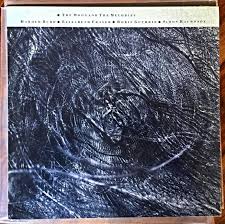Cocteau Twins first appeared on my radar with their 1984 Top 40 hit ‘Pearly-Dewdrops’ Drops’, which I heard on the Radio 1 chart show (imagine!) and then rescued from the 75p box in Wolverhampton HMV (alongside Echo & The Bunnymen‘s ‘The Killing Moon’). Aged 13, that was quite a significant day in my musical development.
After that record’s success, John Peel fairly often repeated the band’s early sessions and soon I was familiar with a lot more Cocteaus stuff. I bought the older Sunburst & Snowblind E.P. and that November’s Treasure album, which continued the band’s thrilling ascent from almost punky Siouxsie & The Banshees territory, (nothing wrong there), into seemingly a genre inhabited by them and them alone. Nowadays, it might be referred to as ‘dream pop’; back then I am not sure anyone had found a word or phrase to adequately cover what Cocteau Twins were creating.
Over the following couple of years, Cocteau Twins were to go through an astonishing purple patch where everything they touched turned not only to gold, but all at once to every colour in the rainbow too. 1985 brought no new album, but three mesmerising E.P.s and by April 1986, another new album was ready. Victorialand featured only singer Elizabeth Fraser and guitarist Robin Guthrie, (the band was usually completed by Simon Raymonde on bass, who has since gone on to found and run the much-loved Bella Union record label), but was a really beautiful piece of work. No drums / beats and vinyl that played at 45rpm to increase the richness of the sound, which was made up of Guthrie’s trademark multi-layered guitars and Fraser’s most extraordinary voice.
By October, the Love’s Easy Tears E.P. hit the shops, and was surely the culmination of another golden year for Cocteau Twins. But wait – another album was in the pipeline, and just a month later in November 1986, Raymonde was back, but in a most unexpected twist, the record also featured ambient pianist Harold Budd.
The Moon and the Melodies was the resulting album. Actually credited to Harold Budd, Elizabeth Fraser, Robin Guthrie, Simon Raymonde, the album was like nothing I had ever heard before, or indeed have heard since. The record featured eight songs: each side started and ended with a ‘vocal’ track (i.e. the full band, plus Harold Budd), with two instrumentals in the middle. The album’s opening track, ‘Sea, Swallow Me’, for my money is the greatest track the band ever recorded. It begins with Budd’s otherworldly piano on its own and is soon joined by Guthrie’s beautiful guitar, Raymonde’s bass and Fraser’s unique vocal. Like many Twins tracks, the lyrics appear to consist of an unfamiliar, invented language, with words chosen for their sounds rather than their meanings. It is a cliche, but the vocals act as another instrument in their own right.
The second track, ‘Memory Gongs’ is led by Budd’s ebbing and flowing piano work, coupled with ambient Cocteaus sounds in what could be the most intoxicating track I have ever heard. To listen to it, even after many hundreds of times, is to disappear to another place. Where the first track could, minus Budd’s piano, arguably have fitted nicely onto another Cocteaus album, the second totally belongs to this one. ‘Why Do You Love Me?’ has a similar make-up and also does not sound of this earth, while ‘Eyes Are Mosaics’ returns Fraser to the fold and would not have sounded out of place on the previous Autumn’s Tiny Dynamine or Echoes in a Shallow Bay E.P.s. It is a fine track, but the one on the album where Budd is least evident.
Onto Side Two and Richard Thomas from Dif Juz makes an appearance (on saxophone) on the first two tracks, ‘She Will Destroy You’ and ‘The Ghost Has No Home’. While the former includes a subtle contribution on the outro, on the latter (another epic instrumental) the saxophone shares pretty much equal billing with Budd’s piano. It doesn’t sound like it would work. It does. Perfectly.
‘Bloody and Blunt’ is the album’s final voiceless track and is also the shortest, based around a circular dreamy guitar riff from Guthrie, while ‘Ooze Out And Away, Onehow’ brings back Fraser’s remarkable voice one last time, building up and up until the drums unexpectedly kick in for the last minute of the album to bring it to a euphoric climax.
The band went on to hit further spectacular heights during their career, but The Moon and the Melodies remains a real jewel in their crown. Cocteau Twins split after 18 years in 1997, sadly meaning that we have now been without them for longer than we had them.




